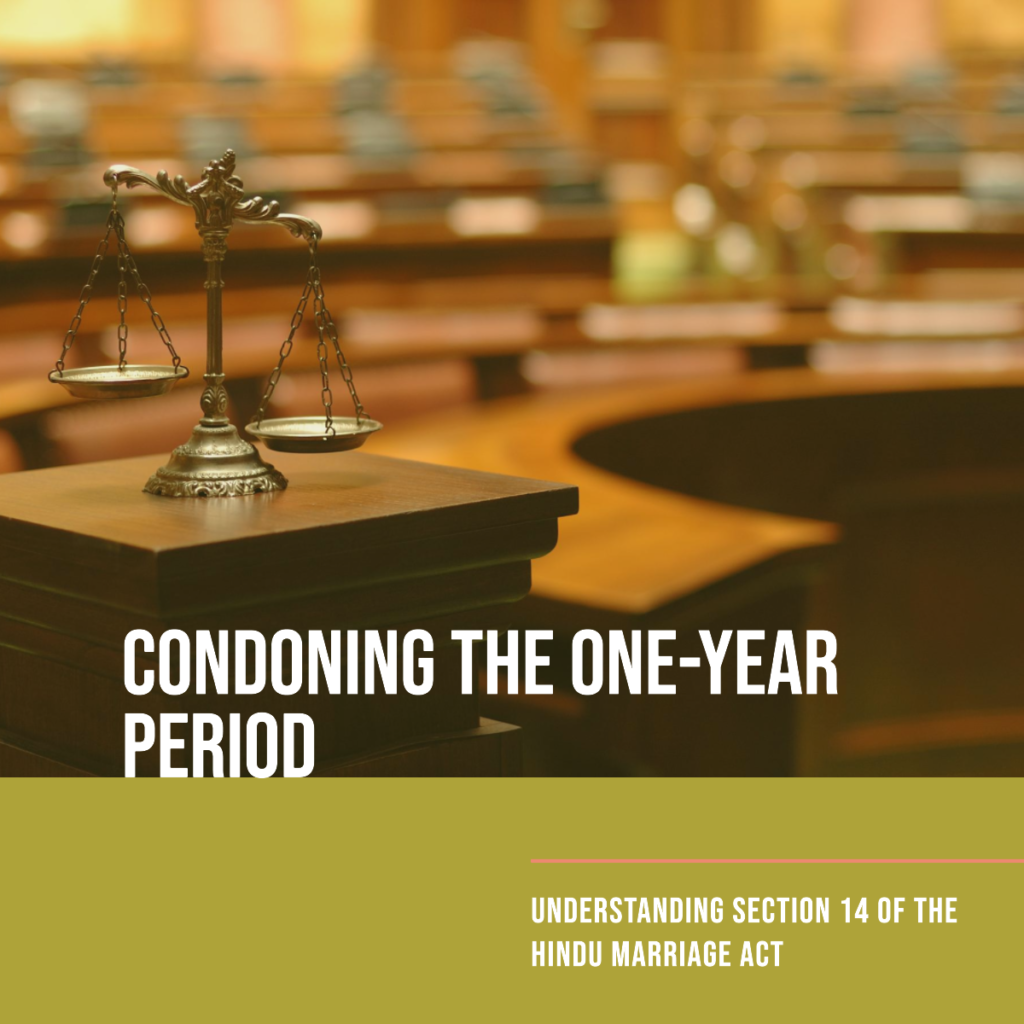
Divorce Within One Year: In India, according to the Hindu Marriage Act, 1955. Divorce cannot be filed within the first year of marriage. Section 14 of the Act explicitly states that “no petition for divorce shall be presented to the district court unless at the date of the presentation of the petition one year has elapsed since the date of the marriage.
This means that you must wait for at least one year from the date of your marriage before you can file for divorce under the Hindu Marriage Act. This rule has exceptions, but they are rare and demand specific circumstances, such as exceptional hardship or depravity by a spouse.
Court’s Authority to Condone the Statutory One-Year Period under Section 14 of the Hindu Marriage Act
Introduction:
Under the Hindu Marriage Act, 1955, there are certain statutory provisions that govern the dissolution of Hindu marriages. One such provision is Section 14, which relates to the time period before which a divorce petition can be filed. It is a common misconception that the one-year period mentioned in Section 14 is rigid and cannot be altered. However, legal precedent and the Act itself suggest that the court has the authority to condone or waive this statutory period under specific circumstances.
Understanding Section 14 of the Hindu Marriage Act:
The Hindu Marriage Act’s Section 14 mandates a one-year waiting period after marriage before filing a divorce petition. This serves as a cooling-off period. During which they can potentially reconcile their differences before seeking divorce.
Court’s Discretion to Condone the Statutory Period:
Contrary to the belief that this one-year period is absolute, the courts have, in various judgments, demonstrated their authority to condone or waive it. Courts often use this discretion when it becomes clear that the marriage has irreparably broken down, and reconciliation is unlikely
.
Key Factors Considered by the Court: While granting permission to file Divorce within ONE YEAR of Marriage.
Substantial Compliance:
Courts have recognized that substantial compliance with the spirit and intent of the law can outweigh the strict adherence to the statutory one-year period. If the divorce petition has been pending for a significant duration, and the one-year period has elapsed during this time. The court may consider this as substantial compliance.
No Chance of Reconciliation:
When it becomes clear that the parties cannot live together as husband and wife and cannot resolve their differences. The court may exercise its discretion to condone the one-year period.
Proviso to Section 14:
Section 14 permits early divorce if the court deems exceptional circumstances exist before one year of marriage. This provision reinforces the court’s authority to make exceptions.
Legal Precedents:
Several judicial decisions have upheld the court’s discretion to waive the one-year period under Section 14 of the Hindu Marriage Act. These decisions have emphasized the importance of assessing each case on its individual merits. Considering the specific circumstances of the parties involved.
IMPORTENT JUDGMENT IN RESPECT OF DIVORCE WITHIN ONE YEAR OF MARRIAGE
Dinesh Kumar Paliwal, J. JUDGMENT
Section 14 of the Act a petition for mutual divorce could be entertained even before the expiry of one year from the date of marriage. It is not mandatory to require compliance with mathematical precision and to warrant rejection for non filing of application under Section 14 of the Act as provision of Section 14(1) of the Act is not mandatory.
Delhi High Court
under the proviso of Section 14 of the Hindu Marriage Act such an application seeking waiver of period of one year as prescribed in the sub-section (1) of Section 14 of the Hindu Marriage Act can be waived and dispensed with on the court being satisfied on the petitioner making out a case for the grant of such waiver
Shri Arvind Kumar vs Smt.Nirmala Bharti @ Neha on 3 August, 2011
Conclusion
In conclusion, while the Hindu Marriage Act does set a one-year waiting period before filing for divorce. This period is not an absolute barrier. The court has the authority to condone the statutory one-year period when it deems fit. Particularly in cases where reconciliation is improbable, and the marriage has irretrievably broken down. It maintains legal adaptability, allowing couples to seek remedies in complex relationship situations when necessary.


Leave a Reply